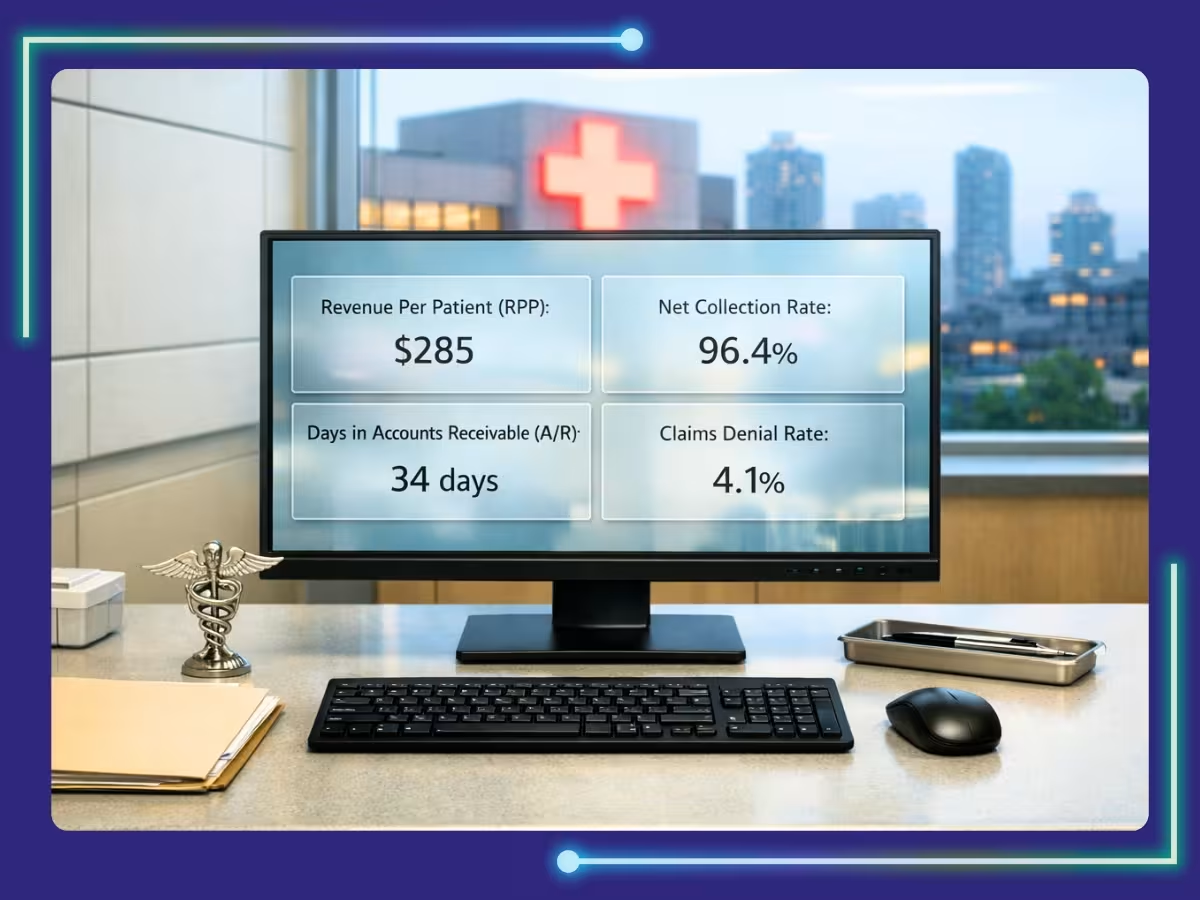In This Blog Post
Share This Article
- Published: Jun 30, 2023
- Last Updated: Jan 23, 2026
- 🔊 Listen
Quick Reads
- Healthcare accounting is essential for financial clarity, meeting compliance, and maintaining sustainability. It helps providers manage everything from billing to budgeting with accuracy and confidence.
- Core accounting components like payroll, medical supply payments, and capital planning can be streamlined with expert accountants using specialized software to improve efficiency and reduce costly errors.
- Financial reports such as income statements, balance sheets, and RVU reports are critical for tracking performance, planning budgets, and supporting informed business decisions.
- Healthcare accounting challenges include managing multi-source revenue, compliance, and operational costs, which can be overcome with the right financial partner.
- Best practices like proper chart of accounts, accurate revenue recording, and monthly book closing ensure transparency and long-term financial health in healthcare settings.
- Outsourcing healthcare accounting offers greater flexibility, expertise, and cost savings while letting you focus more on patient care.

Heal Finances, Not Just People
Get support from top healthcare accounting experts.
If you’ve ever felt overwhelmed trying to keep up with the financial side of running a healthcare practice, you’re definitely not alone. We’ve worked with enough clinics and providers to know just how complex accounting for healthcare can be. Between accurate billing, ensuring compliance, managing payroll, and creating financial reports, it’s a lot to manage. That’s where this guide comes in. Whether you are just starting or looking to streamline up your current processes, understanding the core essentials of healthcare accounting can make a big difference.
What is Healthcare Accounting?
Healthcare accounting is the financial backbone of hospitals, clinics, and medical practices. It tracks all money coming in and going out. This includes billing patients, managing insurance claims, and recording operational costs. Unlike general accounting, it must follow strict healthcare regulations. Moreover, it ensures compliance with standards like HIPAA and Medicare rules.
In addition, healthcare accountants monitor budgets and control financial risks. They also help organizations plan for future expenses and investments. By doing so, they support informed decisions that improve patient care.
Every transaction, from a routine check-up to a surgery bill, must be accurately recorded. Therefore, healthcare accounting demands precision, ethics, and specialized knowledge. It bridges the gap between patient care and financial stability. Without it, even the best hospitals can struggle to stay afloat.
Key Components in Healthcare Accounting
Healthcare accounting is a specialized field that ensures the financial stability of medical organizations. It handles everything from patient billing to long-term capital planning. By understanding its key components, institutions can maintain accuracy, compliance, and cost control. Below are the foundational elements that define accounting for healthcare organizations:
Medical Billing & Recording
In accounting for healthcare, accurate records are vital for audits and long-term financial planning. Medical billing and recording involve submitting claims, tracking insurance reimbursements, and recording all patient-related charges.
Running of Payroll
Payroll in healthcare must reflect varied shifts, overtime, and certifications. Accountants manage wages, benefits, and taxes while ensuring adherence to employment laws. Moreover, timely payroll supports workforce morale and retention.
Medical Supplies Payment
Paying for medical supplies involves reviewing vendor contracts, processing payments, and maintaining inventory records. Accounting systems must monitor recurring costs and adjust for price fluctuations. In addition, timely payments prevent supply chain disruptions and help ensure uninterrupted patient care services.
Cost Estimate
Cost estimates must include direct medical expenses and overheads. This step in accounting for healthcare helps avoid disputes and improves transparency. Moreover, it supports clearer communication with patients and enhances financial forecasting.
Managing Capital Investments
Capital investments, such as facility upgrades or new equipment, require detailed financial analysis. Healthcare accounting evaluates potential returns, sources of funding, and compliance with depreciation rules.
Planning & Budgeting
Effective planning and budgeting are central to accounting for healthcare. This includes forecasting revenues, setting expense limits, and monitoring financial performance. Healthcare accounting teams use historical data and trend analysis to make informed decisions. As a result, institutions stay prepared for financial risks and regulatory changes.
Financial Reporting
One-time financial reporting in healthcare is crucial during audits, mergers, or funding rounds. It involves preparing statements like income reports and balance sheets, aligned with healthcare standards. Accurate reporting builds trust with stakeholders and support regulatory compliance, making it a cornerstone of medical practice accounting.

Key Financial Reports to Track in Healthcare
In healthcare accounting, financial reports serve as essential tools for evaluating an organization’s fiscal health. These documents guide decisions, support compliance, and ensure transparency. Whether used in routine reviews or one-time financial reporting in healthcare, each report plays a distinct role in maintaining accuracy and accountability.
Profit and Loss Statement
The profit and loss statement summarizes revenues, costs, and expenses over a specific period. In accounting for healthcare, it helps assess operational efficiency and financial sustainability. By comparing income against expenses, healthcare providers can identify profitable areas needing cost control, which ultimately supports strategic financial planning.
Balance Sheet
A balance sheet offers a snapshot of the organization’s assets, liabilities, and equity at a specific point in time. This core element of healthcare accounting reveals the institution’s financial position. Moreover, it helps evaluate liquidity and debt levels, assisting administrators in managing resources and ensuring long-term solvency.
Cash Flow Statement
The cash flow statement tracks how cash enters and exits the organization. It distinguishes between operating, investing, and financing activities. In accounting for healthcare, this report ensures that the facility can meet short-term obligations. Additionally, it highlights liquidity concerns and supports proactive cash management decisions.
Budget vs. Actual Report
This report compares projected financial outcomes with actual performance. Healthcare accounting relies on it to monitor variances and adjust operational plans. When budgets deviate significantly, the report helps identify root causes. As a result, institutions can refine forecasts and allocate resources more efficiently in future periods.
Relative Value Unit (RVU) Reports
RVU reports measure provider productivity by assigning value to medical services. In accounting for healthcare, these reports link clinical performance to financial outcomes. Furthermore, they aid in compensation planning and service pricing. RVUs ensure fair evaluation of workloads and support performance-based decision-making in complex healthcare environments.
What are the Challenges in Healthcare Accounting
Healthcare accounting operates in a high-stakes, heavily regulated environment. Financial professionals must navigate complex systems while maintaining accuracy and compliance. From billing errors to talent shortages, several challenges can impact both daily operations and one-time financial reporting in healthcare. Understanding these issues is crucial for building strong and sustainable accounting systems.
Errors in Medical Billing and Coding
Medical billing and coding errors can lead to denied claims and revenue loss. In accounting for healthcare, these mistakes compromise data accuracy and patient trust. Moreover, incorrect coding can trigger audits and compliance penalties. Therefore, ongoing staff training and robust checks are essential to maintain precision in healthcare accounting processes.
Revenue Cycle Management
Revenue cycle management involves tracking patient services from appointment to final payment. Delays or missteps in this cycle disrupt cash flow and reporting accuracy. In healthcare accounting, poor cycle management affects budget forecasting and financial planning. To ensure fiscal stability, each phase must be closely monitored and optimized.
Cash-to-Accrual
Transitioning from cash to accrual accounting is a major hurdle for many healthcare organizations. While accrual methods offer more accurate insights, the shift can be complex and time-consuming. In accounting for healthcare, this change affects how revenues and expenses are recorded, especially during audits and one time financial reporting in healthcare.
Compliance and Data Integrity
Maintaining compliance with healthcare regulations, such as HIPAA and Medicare guidelines, is non-negotiable. At the same time, ensuring data integrity adds another layer of complexity. Healthcare accounting must align financial practices with legal standards, while also safeguarding patient and financial data from errors and breaches.
Shortage of the Right Talent
Skilled professionals with both healthcare and accounting expertise are in short supply. This talent gap impacts everything from daily reconciliations to long-term financial strategy. In healthcare accounting, hiring underqualified staff increases the risk of errors, delays, and noncompliance, making talent acquisition and retention a critical priority.
Best Practices in Healthcare Accounting
To ensure accuracy, compliance, and operational efficiency, healthcare accounting must follow a disciplined set of best practices. From recording revenue correctly to choosing the right accounting structure, each practice strengthens financial reporting. These methods are essential for daily operations, long-term planning, and financial reporting in healthcare environments.
Choosing the Right Accounting Method
Selecting between cash and accrual accounting directly affects financial transparency. In healthcare accounting, accrual methods are preferred for tracking income and expenses accurately. Moreover, they support more reliable forecasting and reporting. This choice lays the groundwork for meeting regulatory standards and ensuring consistency in financial statements.
Selecting the Right Chart of Accounts
The chart of accounts organizes financial data into meaningful categories. In accounting for healthcare, this structure must reflect clinical services, departments, and funding sources. A well-designed chart ensures accurate classification, which simplifies audits, improves budget analysis, and enhances the accuracy of financial reporting in healthcare.
Correct Recording of Patient Care Revenue
Patient care revenue should be recorded when services are rendered, not when payments are received. This approach aligns with accrual accounting and ensures accuracy in healthcare financials. Moreover, timely and correct recording prevents misstatements in revenue reports and supports performance monitoring across service lines.
Reconciliation of Billing and Payments
Reconciliation ensures that billed services match received payments. In healthcare accounting, mismatches can distort revenue figures and delay reporting. Regular reconciliation prevents write-offs and uncovers billing errors. Additionally, it supports accurate one time financial reporting in healthcare by maintaining alignment between patient accounts and financial records.
Payroll and Compensation
Accurate payroll records are critical for budgeting and compliance. In accounting for healthcare, timely processing of wages and benefits maintains trust and ensures adherence to labor regulations, while also reducing the risk of financial misstatement.
Correct Recording of Medical Supplies
Medical supplies should be recorded as expenses when used, not when purchased. This distinction supports accurate matching of costs with services rendered. In healthcare accounting, proper tracking avoids inventory mismanagement and reflects true operational costs, improving budgeting, and long-term resource planning.
Top Accounting Software for Healthcare Accounting
Choosing the right software is vital for managing the financial complexities of healthcare accounting. Each platform offers unique tools that support compliance, reporting, and operational control. Whether for daily transactions or financial reporting in healthcare, the right enhances accuracy, efficiency, and overall financial health.
1. Xero
Xero is a cloud-based platform ideal for small to mid-sized healthcare practices. It simplifies financial tracking and improves operational transparency in accounting for healthcare.
Key Features:
- Real-time income and expense tracking
- Easy bank reconciliation
- Integration with billing and payroll systems
- Customizable reporting dashboards
2. QuickBooks
QuickBooks is a flexible solution tailored for managing healthcare accounting tasks efficiently. It streamlines billing, payroll, and financial reporting.
Key Features:
- Customizable chart of accounts
- Automated payroll processing
- Invoice and payment tracking
- One-click financial reports for audits and reviews
3. NetSuite
NetSuite caters to large healthcare organizations needing robust, scalable financial systems. It enhances compliance and supports advanced reporting.
Key Features:
- End-to-end financial management
- Real-time data dashboards
- Revenue recognition and regulatory compliance
- Automated one time financial reporting in healthcare
4. MS Dynamics
Microsoft Dynamics is suitable for hospital networks and larger healthcare operations. It integrates clinical and financial data for complete oversight.
Key Features:
- Multi-entity and departmental accounting
- Integration with EHR and clinical systems
- Advanced budgeting and forecasting
- Secure compliance-ready financial reports
5. Sage
Sage provides scalable tools for both small clinics and large facilities. It is ideal for ensuring accurate, standards-compliant accounting.
Key Features:
- Detailed budgeting and forecasting tools
- Cost tracking for medical supplies and services
- Customizable financial statements
- Tools for one-time financial reporting in healthcare
How Specialized Healthcare Accounting Services Benefits Business?
Partnering with a specialized healthcare accounting service provider, such as an outsourced agency, can significantly enhance your financial and operational performance. From streamlining day-to-day financial tasks to ensuring regulatory compliance, skilled online accountants provide expert support tailored to the unique needs of your organization.
1. Streamlined Financial Operations
Professional services help streamline all financial processes—from billing to reconciliation. This ensures consistency in accounting for healthcare and reduces manual errors. With structured workflows, Experts focus on strategic planning rather than correcting entry-level mistakes. Moreover, streamlined systems lead to faster and more reliable financial decision-making.
2. Cost Efficiency
Hiring a specialized healthcare accountant saves money by improving efficiency, reducing financial errors, and streamlining reporting. Accurate work reduces costly mistakes and audit risks. Furthermore, if you choose to outsourced accounting services, you eliminate overheads tied to full-time salaries, employee benefits, office space, training, and accounting software, making it a financially sound strategy for many providers.
3. Access to Expert Services
Healthcare accountants with industry-specific knowledge understand complex billing structures, tax regulations, and compliance needs. Accessing their expertise ensures accurate reporting and informed financial strategies. Furthermore, expert oversight minimizes errors and supports proper implementation of accounting for healthcare practices, particularly in regulated environments.
4. Enhanced Financial Clarity
With organized financial data and accurate categorization, organizations gain clear insights into cash flow, profitability, and resource use. This clarity supports more strategic budgeting and planning. Additionally, financial clarity allows healthcare administrators to respond swiftly to financial concerns and improve long-term fiscal health.
5. Timely Financial Reporting
Timely reporting is vital for performance reviews, audits, and funding decisions. A skilled healthcare accountant ensures that reports like balance sheets and income statements are prepared accurately and on schedule. Furthermore, timely financial reporting allows stakeholders to evaluate operations and make well-informed adjustments.
6. Guaranteed Compliance
Healthcare accounting must comply with various laws such as HIPAA, Medicare, and IRS requirements. Professional services ensure that financial practices meet all legal standards. As a result, providers can avoid penalties, maintain patient trust, and confidently undergo audits or reviews without fear of regulatory violations.
7. Scalability
As a healthcare organization grows, its financial processes become more complex. Professional accounting services can easily scale to match increasing needs. This includes handling multi-location operations, expanding payrolls, and managing larger revenue streams, all while preserving accuracy and accountability in accounting for healthcare institutions.
In-House Accountant vs Outsourced Healthcare Accountant
Choosing between in-house and outsourced healthcare accounting is a strategic decision that impacts cost, efficiency, compliance, and other F&A services. While in-house teams offer direct oversight and control, outsourcing provides cost savings, specialized expertise, and scalability.
To differentiate between the two, you can keep the below factors in mind.
| Factors | In-House Healthcare Accounting | Outsourced Healthcare Accounting |
| Cost | Higher fixed costs including salaries, employee benefits, training, and office space. | Generally, more cost-effective with various pricing models; reduces overhead expenses by up to 60%. |
| Expertise | Limited knowledge and experience of the internal team; may lack specialized skills. | Access to a broad range of experts with specialized knowledge in healthcare accounting and compliance. |
| Control & Oversight | Direct supervision and immediate access to financial data and personnel. | Doesn’t need overhead administration; transparent workflow; all files and folders are shared with you. |
| Scalability | Scaling up requires hiring and training new staff, which is time-consuming and costly. | Easily scalable to match business growth or seasonal demands. |
| Technology | May require significant investment in accounting software and IT infrastructure. | Utilizes advanced technologies and software without additional costs. |
| Compliance & Updates | Responsibility lies with internal staff to stay updated on regulatory changes and; the risk of non-compliance. | Outsourced firms stay current with regulations, reducing the risk of non-compliance. |
| Focus on Core Activities | Internal staff may be diverted from core healthcare services to handle accounting tasks. | Allows healthcare providers to focus on patient care while financial experts handle accounting. |
| Flexibility | Less flexible; adapting to changes requires internal adjustments. | Highly flexible to adapt to changing business needs and financial requirements. |
Conclusion
Keeping up with healthcare accounting isn’t easy. But the good news is, you don’t have to do it alone. Whether you decide to handle things in-house or hire an outsource healthcare accounting service provider, the key is understanding what your practice really needs. You need a partner who can help you stay compliant, financially sound, and focused on what matters most, which is patient care.
Whiz Consulting has been serving healthcare organizations for the past 10 years and helping clients care for their patients worry-free. With our excellent healthcare accounting services, and over 100 specialized professionals to handle all your needs, we can help you navigate the complexities of the industry with ease. Reach out to us today and let’s transform your business into the next global success story!

Get customized plan that supports your growth






